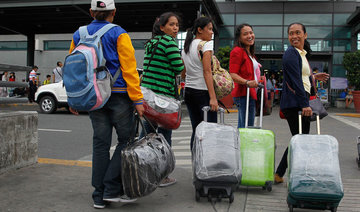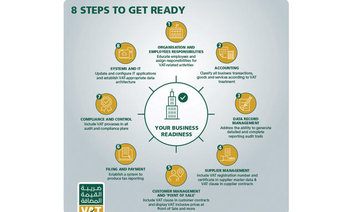DUBAI: Marifhe is a nurse at a hospital in Jeddah – she has been for 24 years – while her husband, Noel, has been employed in Saudi Arabia’s retail industry for three decades.
The couple managed to raise and send their three children back home through college during their long stay in the kingdom, regularly remitting money through banks or money exchanges for their children’s tuition and other expenses.
“It has always been like that since we started working in Saudi Arabia. We always go to Al-Balad [where the exchanges and banks are located] to send money home. It would have been better if there was a system that made it easier for us; and the remittance charges were lower so we could send more to our relatives,” Marifhe told Arab News.
The couple has lost track of the time they have spent patiently waiting in long queues just to send money back home or how much they have spent in remittance charges - money they could have saved or put towards their family.
But Marifhe says she is hopeful, like the other millions of Filipinos working and living abroad, that the recent roll-out of the Overseas Filipino Bank (OFBank) will ease her money concerns and also help plan for her financial future.
OFBank, which was launched on Jan. 18, is actually a revamped version of state-owned Philippine Postal Savings Bank, but with its business model dedicated to provide financial products and services tailored to the requirements of over 10 million overseas Filipino workers (OFWs), a good number of them working in the Middle East.
The bank’s establishment was also the outcome of a campaign commitment made by President Rodrigo R. Duterte, whose candidacy during the 2016 elections received overwhelming support from overseas Filipino voters.
It is a good strategy for OFBank to focus on OFWs: personal remittances from overseas Filipinos reached $31.3 billion in 2017, 5.3 percent higher than the $29.7 billion a year earlier, with major remittance sources such as the US, UAE, Saudi Arabia, Singapore, Japan, Qatar and Kuwait. Cash remittances coursed through banks meanwhile reached $28.1 billion, or up 4.3 percent from year-ago levels of $26.9 billion.
The money that OFWs send home provides a major backbone for the Philippine economy, which last year accounted for about 10 percent of the country’s gross national product and has been the traditional fuel for household spending power even during leaner economic periods.
Filipinos send a vast proportion of their incomes home, leaving themselves with barely enough to meet their daily living costs.
“I would like to see how the bank [OFBank] would make remittance costs cheaper, as well as give me more trust in the [Philippine] banking system. I have not much trust in Philippine banks,” Marifhe said.
OFBank – to be run by the government’s Land Bank of the Philippines – will have in its portfolio 15 banking products and services especially suited for OFWs including peso savings, time deposits, checking accounts, loan products, remittance services, payments services as well as investment products such as Unit Investment Trust Funds.
OFBank also plans to offer a non-collateral loan package for Filipinos planning to return to the Philippines to start their own businesses or build their homes, at affordable interest spreads.
“We have developed these products to tailor fit the banking needs of overseas Filipinos,” Alex Buenaventura, the chairman of OFBank, said during the bank’s launch. “OFBank is the only bank in the Philippines with loans, saving and investment products for OFWs.”
But Marifhe, and other expatriate Filipinos in Saudi Arabia, will have to wait for OFBank to have a presence in the Kingdom as the lender plans to have its first representative office located in Dubai, and the second one in Bahrain.
The Philippine government is also looking at the possibility of deploying the digital financial services offered by China’s Alibaba Group for remittances to be processed through OFBank.
Ant Financial’s low-cost mobile payment technology – which helped boost financial inclusion in China – could also be used in the Philippines and help reduce the cost of remittances.
And that is definitely good news for Marifhe who, despite being an OFW for over two decades, still has no plans to go back home in the Philippines and retire.
“I will not earn in the Philippines what I currently earn here [in Jeddah], so while my services are still needed by the hospital I will stay. But I also want to secure myself financially so I hope OFBank can help me with that,” she said.
Overseas Filipinos ‘hopeful’ ahead of opening of bank that pledges lower remittance charges
Overseas Filipinos ‘hopeful’ ahead of opening of bank that pledges lower remittance charges
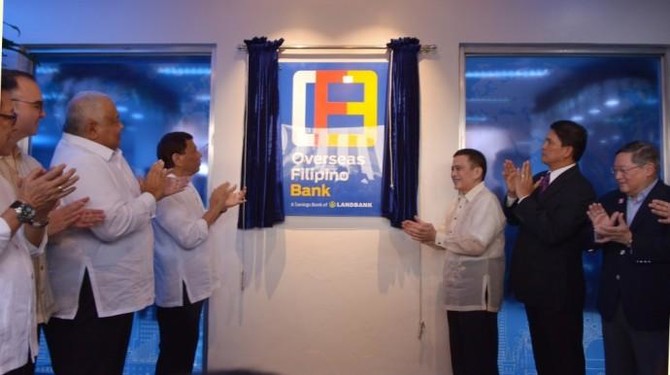
Pakistan says expecting more high-level Saudi business delegations amid investment push

ISLAMABAD: Pakistan expects continued visits by high-level business delegations from Saudi Arabia in the upcoming weeks to further explore investment opportunities facilitated under the Special Investment Facilitation Council, the Foreign Office announced on Thursday.
The statement came just days after Prime Minister Shahbaz Sharif concluded his visit to Riyadh, where he addressed the two-day World Economic Forum conference.
During his visit, Sharif met with Crown Prince Mohammed bin Salman and several Saudi ministers to strengthen bilateral relations and economic partnerships between the two nations.
Prior to his visit to the Kingdom, Saudi Foreign Minister Prince Faisal bin Farhan was in Islamabad with a large delegation, saying the Pakistani administration’s resolve to strengthen the economy would yield “significant benefits.”
“Saudi investors have been coming to Pakistan in recent months, and engaged with the SIFC in terms of exploring opportunities for Saudi investments in Pakistan, and this is an ongoing process, and we expect similar high-level business delegations to undertake visits to Pakistan in the coming days and weeks as well,” Foreign Office spokesperson Mumtaz Zahra Baloch told reporters in her weekly media briefing.
She added that both countries were involved in robust and mutually beneficial dialogue that had gained significant momentum in recent months.
“Pakistan and Saudi Arabia are engaged in consultations with each other in terms of increased Saudi investments in Pakistan, including in the energy domain,” she added.
Asked about reports of Pakistan providing military bases to the US, Baloch called them rumors.
“Pakistani has no plan to provide any bases to a foreign country against any other country,” she said.
Speaking about the Organization of Islamic Cooperation’s summit in Gambia, the spokesperson said the country’s deputy prime minister, Ishaq Dar, would highlight the ongoing genocide in Gaza, the right to self-determination of the people of Jammu and Kashmir, the imperatives of solidarity and unity of the Muslim ummah, rising Islamophobia, issues of climate change, terrorism, and other contemporary global challenges.
She said Pakistan strongly condemned the escalating violations of human rights by Israel and increasing number of illegal Israeli settlements in the West Bank.
“Israel’s actions constitute a breach of international law, including humanitarian laws and other pertinent international laws, and these acts also undermine any prospects of a two-state solution,” she added.
Saudi authority imposes $11.4m in fines on investors for dodgy practices

RIYADH: Saudi Arabia’s Capital Market Authority slapped fines to the tune of SR42.9 million ($11.4 million) on 13 investors and others found in violation of the law.
A total of SR17 million fines have been imposed on 13 investors “for placing purchase orders that influenced the share price, some of which were linked to sale orders, while trading on the shares of listed companies.”
A CMA statement said: “They and other investors were obligated to pay a total of SR25.9 million for the illegal gains achieved in their investment portfolios.”
The authority clarified that the definitive decision of its Appeals Committee for the Resolution of Securities Disputes resulted from the coordination and mutual collaboration between the authority and relevant entities.
It added that the action was taken in light of the public criminal lawsuit filed by the Public Prosecution.
CMA underscored the importance of investor confidence in fostering the growth and advancement of the financial market. It reiterated its commitment to vigilantly observe any misconduct, apprehend wrongdoers, and ensure the implementation of appropriate measures to impose penalties.
Moreover, it stated that these actions are consistent with the authority’s endeavors to nurture an appealing atmosphere for investors of all types, shielded from unjust, precarious, deceitful, fraudulent, or manipulative activities.
Saudi energy minister lauds growing economic ties with Uzbekistan

RIYADH: Saudi Arabia and Uzbekistan’s economic cooperation models reflect mutual commitment to prosperity through shared goals in the two countries’ 2030 plans, said the Saudi energy minister.
During the main dialogue session of the third Tashkent International Investment Forum, Prince Abdulaziz bin Salman emphasized the distinguished relations between the two nations and the commitment of their leaderships to enhance and develop cooperation in all fields, particularly in the energy sector.
Uzbekistan President Shavkat Mirziyoyev also attended the meeting.
The Saudi minister pointed out that economic cooperation between the two countries serves as a model, especially in light of the “Uzbekistan 2030” strategy and the Kingdom’s Vision 2030, with their similar goals aimed at economic growth, diversification, and sustainable development, reflecting a mutual commitment to building a prosperous future for both nations, according to the Saudi Press Agency.
“The bilateral relations saw a notable advancement subsequent to a meeting between Crown Prince Mohammed bin Salman and President Mirziyoyev in Riyadh in 2022,” he said.
Prince Abdulaziz stressed the significance of the energy sector in the growing relations between the two nations, particularly in renewable energy, highlighting the substantial involvement of Saudi companies in Uzbekistan, exemplified by ACWA Power.
He elaborated on the investment flowing between the two countries in this domain, eclipsing $14 billion, with the aim of producing over 11 gigawatts of renewable energy electricity, affirming that Uzbekistan has demonstrated a serious commitment to achieving a fair and equitable energy transition, aligning with the Kingdom’s aspirations.
The energy minister further underscored the rational stances jointly embraced by both nations, placing significant emphasis on the critical aspects of energy security, development, and conservation.
He also underscored the two countries’ collaborative roles in addressing climate change through collective endeavors.
Recently, ACWA Power signed a power purchase agreement with the National Electric Grid of Uzbekistan for the Aral five-gigawatt wind power project worth SR18.2 billion ($4.85 billion).
Two weeks ago, ACWA Power announced it had secured an $80 million equity bridge loan from the Bank of China for its projects in Uzbekistan.
The Saudi entity said the fund will boost its Tashkent 200 megawatts solar photovoltaic power plant and 500 MW per hour battery energy storage system project in Uzbekistan.
“This transaction culminated the initial agreement reached during the 3rd BRF (Belt and Road Forum) summit in October 2023, where ACWA Power was represented by its chairman as a keynote speaker,” the company said in a statement.
Alvarez & Marsal opens regional headquarters in Riyadh
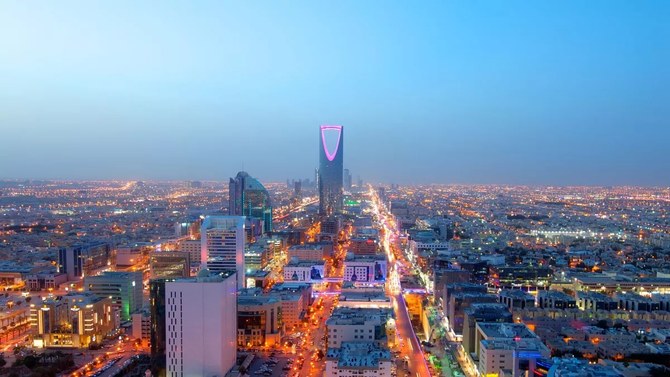
RIYADH: Underscoring international confidence in the Saudi economy, global consulting firm Alvarez & Marsal has become yet another company to have opened its regional headquarters in Riyadh.
In a press statement, the US firm stated that the inauguration of the new regional headquarters underscores its commitment to contributing to the country’s transformation agenda.
“As the company continues to deepen its roots in the country, with expertise across various sectors — from banking and tax to healthcare and disputes and investigations — this strategic move aims to leverage local insights in the Kingdom to drive sustainable growth and innovation.” the company said.
Additionally, A&M announced that it has included 13 skilled Saudi graduates in the inaugural batch of its Bidayah Graduate Program.
The company stated that these candidates were selected from a competitive pool of applicants, describing the chosen individuals as representing the bright future of the Kingdom and reflecting the potential that A&M sees in local talent.
James Dervin, managing director of A&M in the Middle East and co-head in the region, stated that the program is designed to develop the next generation of execution-focused leaders in management consulting. It is guided by the A&M principles of leadership, action, and results.
“Over the course of 12 months, participants will undergo rigorous training, engage in live project work, and receive mentorship from seasoned industry experts,” he said.
Dervin added: “Coupled with the incorporation of our regional headquarters in Saudi Arabia, the program underscores A&M’s commitment to investing in the professional development of Saudi nationals and aligning with the Kingdom’s ambitious Vision 2030,”
He further noted that the new graduates will have a significant, positive impact on his firm and the clients it serves.
Commenting on the close alignment of A&M’s global brand with the local market dynamic in Saudi Arabia, Bryan Marsal, A&M’s CEO and co-founder, said: “The all-encompassing nature of the Saudi Arabian transformation is driving significant demand for A&M’s distinctive ‘get-stuff-done’ brand of services — for our ability to fix problems, our ‘skin in the game’, and our freedom from audit conflicts.”
With over 9,000-strong workforce across six continents, A&M generates tangible results for corporations, boards, private equity firms, law firms, and government agencies grappling with intricate challenges, according to its website.
More than 180 major global companies and organizations have already established regional headquarters in the Saudi capital. These include Apple, Microsoft and Alibaba, as well as the IMF, IBM, and Google.
Other notable entities on the list include German consultancy firm TUV Rheinland, PwC Middle East, Aramex and Amazon.
UAE banks’ aggregate capital, reserves exceed $136bn
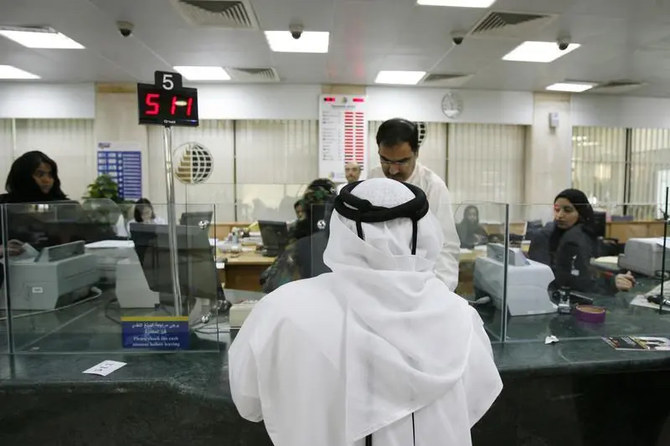
RIYADH: UAE-based banks’ aggregate capital and reserves reached 501.5 billion dirhams ($136 billion) at the end of February, up 14.4 percent year-on-year, according to new data.
The latest statistics from the Central Bank of the UAE showed that on a monthly basis, the total capital and reserves grew 0.95 percent, reflecting an increase of approximately 4.7 billion dirhams, according to the Emirates News Agency, also known as WAM.
This rise in figures falls in line with the central bank’s goal of enhancing monetary and financial stability in the country.
Moreover, the data indicated that national banks accounted for around 86.5 percent of the aggregate capital and reserves of banks operating in the UAE. At the end of February, they recorded a total of 433.7 billion dirhams, an annual rise of 14.6 percent.
On the other hand, the share of foreign banks settled at 13.5 percent, hitting 67.8 billion dirhams at the end of the same month, reflecting a 13.2 percent surge compared to the same period a year earlier.
Furthermore, at the end of February, the total capital and reserves of banks operating in Dubai alone stood at 246.4 billion dirhams, logging a year-on-year growth of 15.1 percent.
Additionally, banks operating in Abu Dhabi recorded around 217 billion dirhams, up 13 percent from the corresponding period in 2023.
Meanwhile, the cumulative capital and reserves of banks operating in other emirates combined reached an estimated 38.1 billion, reflecting a 15.5 percent climb in comparison to the same period a year prior.
In March, a top executive at Roland Berger said that UAE bank branches were witnessing the highest revenues in the region, amounting to $18.6 million per branch.
This was driven by the nation’s digital transformation, which enabled financial institutions in the Gulf Cooperation Council to reduce the number of banking branches by 328 within three years, Saumitra Sehgal, the global consulting firm’s head of financial services in the Middle East, told WAM, at the time.
Sehgal also pointed out at the time that the number of bank branches across GCC nations decreased from 4,067 at the end of 2019 to 3,739 by December 2022.
He further noted that banks in the UAE saw the highest number of outlets merge and reduce with the support of digital transformation between 2019 and 2022.



